Making the Most Out of Old Pots and Pans Through Recycling
Are you wondering what to do with that pile of worn-out pots and pans taking up space in your kitchen cabinets? Before you toss them in the trash, consider the many ways to give your old cookware a new life. Recycling old pots and pans is a sustainable choice that benefits your home, community, and the environment. This comprehensive guide will walk you through various methods to repurpose, recycle, and creatively reuse your aged cookware.
Why Should You Recycle Old Pots and Pans?
Millions of nonstick pans, aluminum skillets, and cast-iron pots end up in landfills each year. From the production of new metal cookware to the decay of old items, the environmental footprint can be substantial. Recycling cookware not only helps reduce landfill waste but also conserves valuable resources by turning these materials into something new and useful.
- Environmental Impact: Most pots and pans contain metals such as aluminum, steel, copper, and cast iron, which are recyclable and highly valuable when reused.
- Resource Conservation: Recycling old cookware reduces the demand for raw materials, saving energy and natural resources.
- Waste Reduction: By finding alternatives to tossing out your nonstick or metal cookware, you minimize contributions to overflowing landfills.

How to Determine If Your Old Cookware Is Recyclable
Not all old pots and pans can be recycled in the same way. Factors to consider include the type of material, the presence of nonstick coatings, handles, and any plastic or glass components.
Common Types of Recyclable Cookware
- Aluminum Pans: Most recycling centers accept clean aluminum cookware.
- Cast Iron Pots: Even heavily rusted cast iron can be recycled or restored.
- Stainless Steel Cookware: Durable and widely recyclable.
- Copper Pots: Highly sought-after at scrap yards but may require handle removal.
Tip: Nonstick and ceramic-coated pans may not be recyclable through curbside programs due to their coatings. Check local guidelines before placing them in the recycling bin.
Recycling Options for Old Pots and Pans
1. Metal Scrap Yards
Most metal scrap yards readily accept old cookware made of aluminum, cast iron, stainless steel, or copper. If possible, remove non-metal components such as plastic handles and glass lids. Call ahead to verify which materials are accepted and whether you need to separate different metals.
- Gather similar cookware types to maximize your return.
- Ensure items are clean and free from food debris.
- Ask about drop-off hours and any preparation required.
2. Municipal Recycling Programs
Many cities offer bulk or metal pickup events, especially for residents disposing of large kitchen items. Contact your local sanitation department or visit the city's waste management website to determine eligibility and guidelines. Be sure to separate recyclable metals from non-recyclable parts.
3. Manufacturer Take-Back Programs
Some cookware brands, like Calphalon and GreenPan, offer recycling programs for their products. You may be able to mail old pans back to the manufacturer, where they'll be responsibly recycled or refurbished. Look for packaging inserts, warranty documents, or check the company's website for details.
Creative Ways to Repurpose Old Pots and Pans
If recycling isn't an immediate option, why not get creative? Give your old cookware a second life by repurposing it into practical or decorative home items. Repurposing pots and pans reduces waste while adding unique charm to your living space.
Upcycle Cookware Into Garden Planters
- Rustic Flower Pots: Drill holes in the bottom for drainage. Fill with soil and plant herbs, succulents, or flowers.
- Hanging Planters: Use an old skillet or frying pan as the base and add rope or chains for hanging.
Transform Into Home Decor
- Wall Art: Paint, mosaic, or stencil pans and pots for a quirky and original kitchen display.
- Clock Face: Attach clock hands to a round skillet for a functional upcycled wall clock.
Storage and Organization Ideas
- Desk Organizers: Use small saucepans for storing office supplies like pens, paper clips, or art materials.
- Craft Bins: Hold sewing, knitting, or miscellaneous craft items.
For the Crafty: DIY Projects Using Old Pans
Let your imagination run wild! Some popular DIY ideas include pot lid trivets, pan-based bird feeders, and cast iron pan molds for homemade candles or soap.
Donating Used Cookware
If your old pots and pans are still functional but no longer serve your needs, consider donation. Many local charities, thrift stores, and shelters gladly accept gently used cookware. You'll help someone set up a first apartment or support community programs, extending the usefulness of your kitchenware.
Where to Donate Cookware
- Goodwill and Salvation Army locations
- Local homeless, women's, or family shelters
- Community kitchens, churches, or food banks
Tip: Make sure donated items are clean and in reasonable working condition.
Best Practices Before Recycling Old Pots and Pans
- Clean Thoroughly: Remove grease, residue, and food particles before recycling.
- Disassemble When Possible: Take off plastic or wooden handles, non-metal parts, and separate glass lids.
- Research Local Requirements: Always check your city's recycling policy regarding kitchenware and metals.
- Check for Hazardous Material: Some cookware, especially older items, may have coatings containing PFOA, PTFE, or other chemicals. Handle with care and consult local hazardous waste guidelines if necessary.
What About Nonstick Pots and Pans?
Nonstick pans, particularly those with Teflon or ceramic coatings, may not be accepted by metal recyclers because of the coatings. However, some manufacturers have take-back programs for these items. If your local recycling center doesn't accept coated pans, look into specialty recycling companies or drop-off locations for hard-to-dispose-of goods.
If no recycling options exist, consider repurposing nonstick pans as serving trays, storage bins, or creative home decor.
FAQs About Recycling Old Pots and Pans
Can you recycle pots and pans in your curbside bin?
Many municipal curbside programs do not accept large metal items such as pots and pans. Always check with your local recycling program before placing cookware in recycling bins.
How should you handle pots and pans with plastic or wooden handles?
Before recycling, try to remove non-metal parts like handles. If they cannot be removed, ask your recycling provider if partial items are acceptable.
Are rusted or broken pans still recyclable?
Yes, scrap metal facilities usually accept even rusted or heavily damaged cookware, especially if they are primarily made of a single metal type.
The Environmental Benefits of Recycling Old Cookware
- Reduces Mining: Recycling metals helps reduce the need to extract raw resources from the earth.
- Lowers Emissions: The process of recycling metals typically emits fewer greenhouse gases than primary production.
- Supports Circular Economy: Keeping metals and materials in circulation reduces the overall environmental impact of our daily lives.
Getting the Most Value Out of Old Pots and Pans
Although most people focus on disposal, old pots and pans can be valuable in other ways:
- Selling for Scrap: Some high-quality cookware, particularly copper and cast iron, can fetch a reasonable price at scrap yards.
- Repurposing for Profit: Sell upcycled cookware as garden planters, artsy home goods, or craft supplies online or at flea markets.

Step-by-Step Guide to Recycling Old Pots and Pans
- Sort through your cookware. Identify which pots and pans are ready for recycling, which are still useable, and which could be upcycled.
- Remove all non-metal parts, such as handles, knobs, and glass lids.
- Clean thoroughly to remove any grease, dust, or food residue.
- Check your local recycling guidelines and locate nearby metal recycling facilities or events.
- If reusing or repurposing, gather your supplies and let your creativity shine!
Conclusion: Give Old Cookware a New Life
It's easy to overlook the potential of old pots and pans beyond their cooking days. By recycling old cookware, repurposing, or donating, you make a positive, eco-friendly choice with lasting impact. Reduce waste, conserve resources, and maybe even uncover a new hobby or artistic endeavor in the process.
Whether you choose to drop your old cookware at a metal recycler, donate it to those in need, or reimagine it as a charming home accent, your actions make a difference. The next time you clean out your kitchen, remember that those battered pots and pans are far from trash--they're opportunities for sustainability and creativity!
Start recycling, upcycling, or donating your old pots and pans today - and inspire others to do the same!
- Reduce waste
- Support sustainability
- Get creative with upcycling
To learn more about making the most of old pots and pans through recycling, consult your community's recycling guidelines, reach out to local charities, or explore upcycling ideas online. Every pan and pot has potential--give yours a new purpose!
